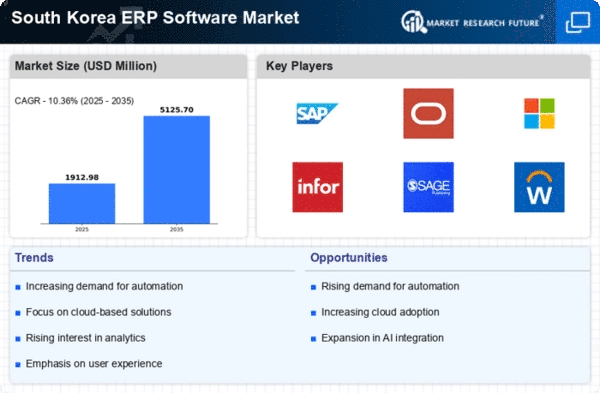Focus on Supply Chain Optimization
Supply chain optimization is emerging as a crucial driver in The ERP Software Market. South Korean companies are recognizing the importance of efficient supply chain management in maintaining competitiveness. ERP systems that provide end-to-end visibility and control over supply chain processes are increasingly sought after. The ability to track inventory levels, manage supplier relationships, and forecast demand can lead to significant cost savings. It is estimated that businesses utilizing ERP solutions for supply chain management can reduce operational costs by up to 25%. This focus on optimization is likely to continue influencing the market.
Regulatory Compliance and Data Security
In South Korea, stringent regulatory requirements and the need for data security are significant drivers of The ERP Software Market. Organizations are increasingly required to comply with various regulations, including data protection laws. ERP systems that offer robust compliance features are in high demand, as they help businesses mitigate risks associated with non-compliance. The market is witnessing a shift towards solutions that not only ensure compliance but also enhance data security. It is estimated that companies investing in ERP solutions with advanced security features can reduce data breach risks by up to 40%, making this a critical factor for businesses.
Rising Demand for Operational Efficiency
The increasing need for operational efficiency is a primary driver in The ERP Software Market. Organizations in South Korea are actively seeking solutions that streamline processes and reduce operational costs. According to recent data, companies that implement ERP systems can achieve up to 30% improvement in productivity. This trend is particularly evident in manufacturing and retail sectors, where the integration of ERP solutions has led to enhanced inventory management and reduced lead times. As businesses strive to remain competitive, the demand for ERP software that can provide real-time insights and analytics is likely to grow, further propelling the market forward.
Increased Investment in IT Infrastructure
The growing investment in IT infrastructure among South Korean businesses is a notable driver of The ERP Software Market. Organizations are allocating more resources to upgrade their technology stacks, which includes the adoption of ERP systems. This trend is fueled by the need for improved data analytics, automation, and integration capabilities. As companies modernize their IT infrastructure, the demand for ERP solutions that can seamlessly integrate with existing systems is expected to rise. Recent reports suggest that IT spending in South Korea is projected to grow by 5% annually, indicating a favorable environment for ERP software adoption.
Growth of E-commerce and Digital Transformation
The rapid growth of e-commerce in South Korea is reshaping the landscape of The ERP Software Market. As online retail continues to expand, businesses are increasingly adopting ERP systems to manage their operations more effectively. The integration of ERP with e-commerce platforms allows for seamless order processing, inventory management, and customer relationship management. Recent statistics indicate that e-commerce sales in South Korea are projected to reach $100 billion by 2025, driving the demand for ERP solutions that can support this growth. Consequently, the need for scalable and flexible ERP systems is becoming more pronounced.

















